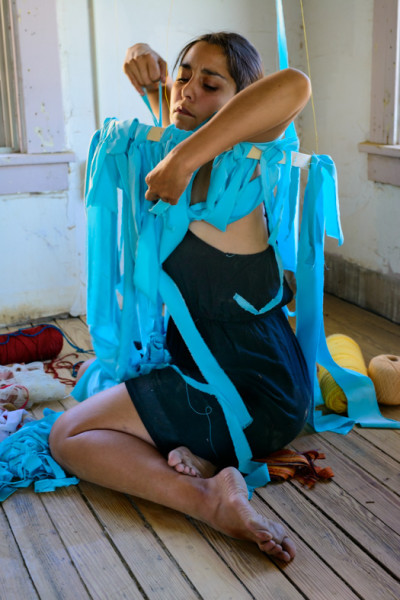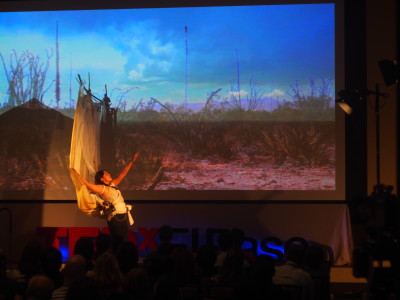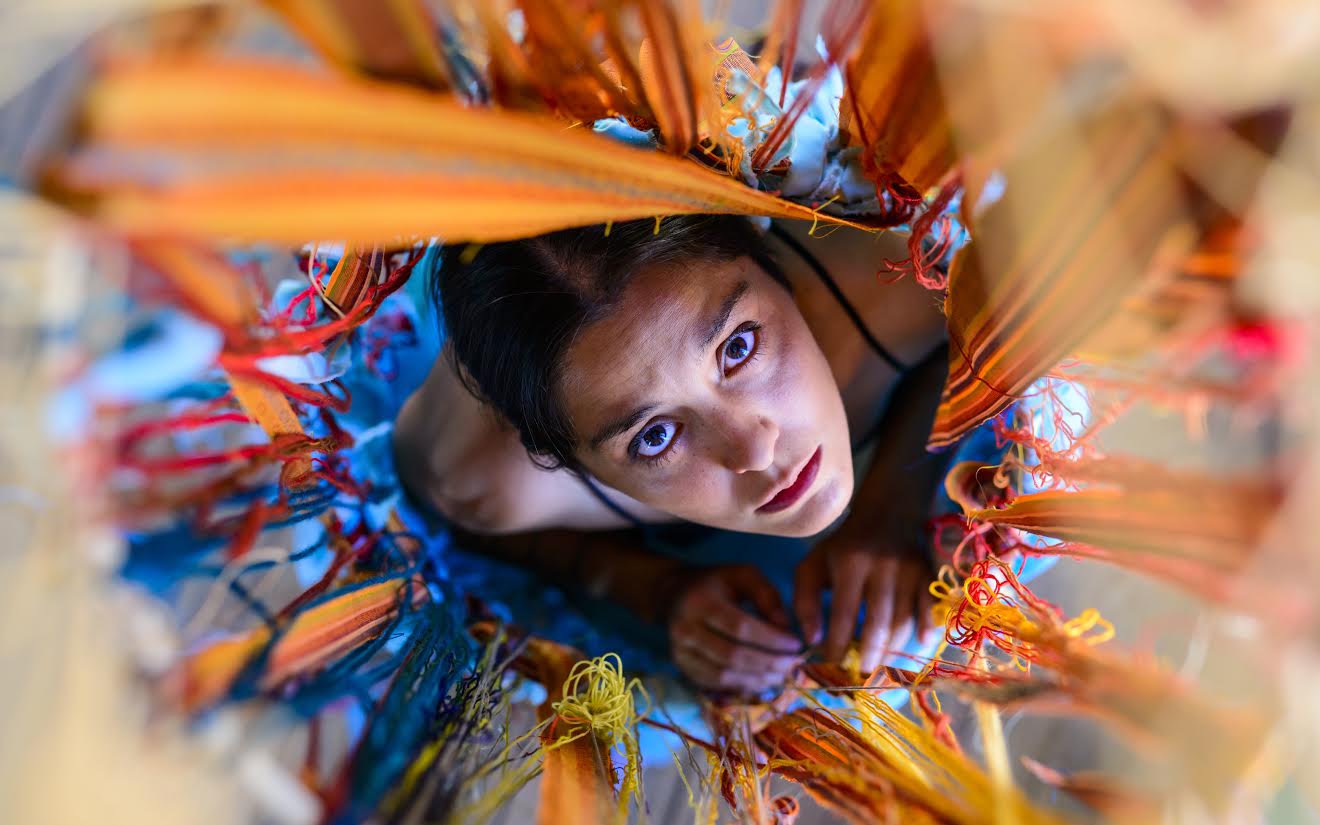Found in Translation
For each issue of Art Avenue, we’ll highlight a speaker from the 2015 TEDxElPaso conference, which was held at the El Paso Community Foundation Room in May. An independently organized event, TEDxElPaso continues the national non-profit TED’s mission to share “ideas worth spreading.”

Xochitl Rodriguez
Photo by Federico Villalba
The first minute of transdisciplinary artist Xochitl Rodriguez’ time on stage during her speech “Speak Without Speaking” at the 2015 TEDxElPaso conference consisted of no words, yet a message of tranquil exploration was implied through her clothes and body movement.
Making her way towards the platform at the El Paso Community Foundation Room, Rodriguez embodied a boat as she swayed the large sail she wore from side to side. Standing in front of a video projection of the desert, she lingered on stage before speaking, her voice as calm as the sound of the gentle wind that played in the background.
“I turned myself into a boat after spending 14 months in the Kingdom of Bhutan,” Rodriguez said. “I had sailed around the planet from the desert to the Himalayas and back again.”
In 2009, after earning her BFA at the University of Texas at El Paso, Rodriguez became the first international artist in residence invited to stay in Bhutan. There, she was asked to teach children about contemporary sculpture and public art.
Of course I realized fairly quickly that my understanding of what that would entail was so far from what it actually means to teach contemporary art in the remote Himalayas,” Rodriguez said with a smile.
While one might imagine that bringing contemporary art to a country unfamiliar with the form had the biggest impact on Rodriguez, what she said she ultimately learned from the experience was a new, universal way to communicate.
“The [TedxElPaso] talk evolved from those ideas because I didn’t like to speak and I knew I could communicate in other ways that were way more effective than speaking,” Rodriguez later said at her home in central El Paso. “And now my whole artistic practice is founded on these ideas of action versus words and living examples instead of stuff you see on a wall. Everything I make is about interaction and engagement without words so that nobody is excluded.”
Bhutan is where Rodriguez’ artistic revelation came to be, she said. She learned that art, as a universal language, has the power to help people transcend physical and cultural barriers and connect with one another.

“All the world has a right to be fluent in art,” Rodriguez said during her speech. “It is in fact a language and if a community can’t access it, can’t understand it, can’t create it or generate it and most importantly can’t relate to it, then that community will not thrive, will not participate in or contribute to the very evolution of humanity in the twenty first century.”
Rodriguez’ transformative experiences emerged through every project she led with her group of Bhutanese youth. One public exhibition she led was to explore the waste generated in Bhutan.
“It took me about two weeks to realize that my students had no concept of what waste actually meant in relation to their way of life,” Rodriguez said in front of a projected image of one of Bhutan’s landfills. “And so we hopped on a bus and we hitched a ride on some dump trucks and we rode for miles and miles to the top of the mountain to the country’s largest landfill.”
Most of the children saw the garbage for what it was, but one student compared the trash to an ocean wave, sparking the idea for the group to create a boat for their exhibition. Rodriguez said a fellow artist asked if she considered that no one in Bhutan had a concept of a boat. Later, the children discovered that the neighbors filled the boat they created with trash.
“They said, ‘Certainly now madam, this boat will sink in a sea of garbage,’” Rodriguez said. “That was the moment, the unmistakable moment, when the fundamental exchange of ideas occurred. They had become translators.”
They also projected images of rice paddy fields onto Changjiji, the government housing complex in the capital city of Thimphu, as a symbol of their culture being replaced by urbanization, Rodriguez said.
Exhibiting work that everyone can connect to was another important message Rodriguez wanted to convey during her speech, she said.

Xochitl Rodriguez
Photo by Federico Villalba
“It is a national problem where artwork isn’t made for people, but it’s made for some other audience that probably likes it, but their lives wouldn’t be changed by it,” Rodriguez later said. “You take art onto the streets and you take art to people who don’t have it and their lives would change. The whole city would change if we used art that way.”
As prayer flags danced in the wind outside her window, it was clear that a piece of the Kingdom of Bhutan would always be with Rodriguez. Talking about her experience at the small country was like ending a chapter, she said.
Her latest chapter has been a community artist collaborative she co-founded called the Caldo Collective. Every few months, a member of the collective hosts a “Frijol Feast” in which the community is invited to a dinner where several artists propose their project ideas.
From the collaborative came the Transient Triangle Project, which transformed an alleyway in Manhattan Heights into a two-hour multimedia pop-up exhibit this past July. As attendees traveled down the alley viewing video projections, interpretive performances and paintings, the exhibit echoed Rodriguez’ message at TEDxElPaso.
It’s about creating a moment in somebody’s life instead of a thing for someone,” Rodriguez said.

